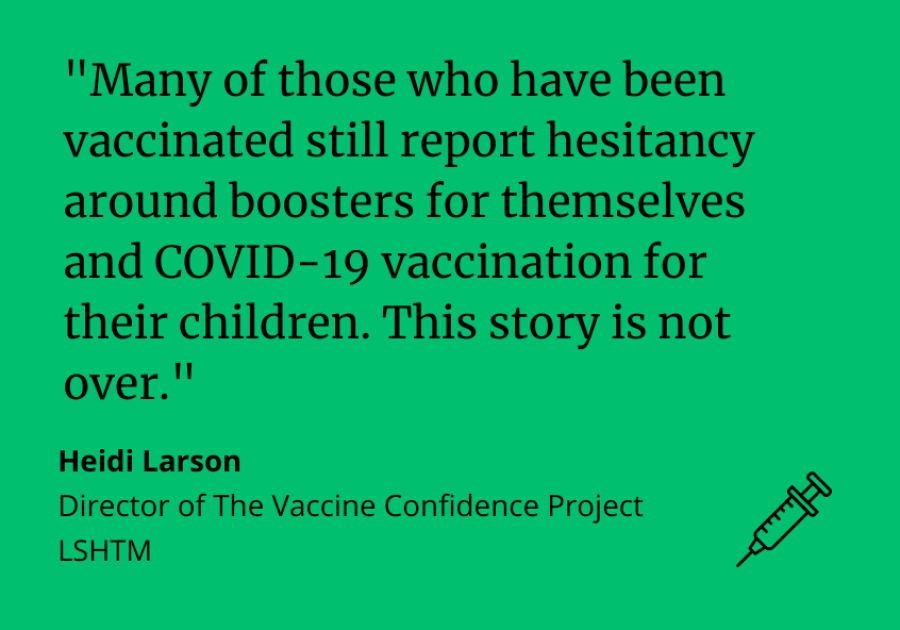Global COVID-19 vaccine acceptance rising but hesitancy remains
13 January 2023 London School of Hygiene & Tropical Medicine London School of Hygiene & Tropical Medicine https://lshtm.ac.uk/themes/custom/lshtm/images/lshtm-logo-black.png
Acceptance of COVID-19 vaccines increased overall by 5.2% in 2022 compared to 2021, according to a survey of 160,000 individuals in 23 countries, published in the journal Nature Medicine.
However, levels of acceptance varied greatly amongst countries, with eight reporting increases in hesitancy ranging from 1% in the UK to 21.1% in South Africa. Of those who were fully vaccinated, 12% reported that they were still hesitant and even likely to refuse a booster dose.
These findings were presented by an international team of researchers including Prof Heidi Larson, who leads The Vaccine Confidence Project at the London School of Hygiene & Tropical Medicine (LSHTM). The aim to help guide policymakers to more effectively target communication strategies and vaccination campaigns.
Despite a large, global rollout of safe and effective vaccines against SARS-CoV-2, hesitancy to receive these, sustained partly by misinformation and mistrust, is still a hurdle to the full realisation of their potential in mitigating the impact of the COVID-19 pandemic.
Using a 30-question, online survey the team investigated trends in worldwide vaccine acceptance between 2021-2022. A total of 23,000 respondents aged 18 or over from 23 countries whose populations represent 60% of the global total were surveyed between 29 June and 10 July 2022. Half of these respondents were women, one-fifth had a university degree and one in 10 were healthcare workers.
Overall, the team found that there was general willingness to accept vaccination – 79.1% of those surveyed – an increase of 5.2% compared to figures from June 2021. Belief in vaccine efficacy and safety was associated with acceptance.
Although vaccine acceptance increased in most countries, vaccine hesitancy was on the rise in eight countries, ranging from 1% in the UK to 21.1% in South Africa. Males in Nigeria and Peru were more likely to be hesitant, whilst in countries such as China and Poland, females were more likely to be hesitant . The team found no overall association between income and hesitancy across the board.
Approximately one in eight vaccinated survey respondents reported that they were hesitant to receive a booster dose, ranging from 1.1% in China to 28.9% in Russia. Similarly to general vaccine hesitancy, demographic factors played a role in country-specific variance in opinions of booster vaccines. For example, in Spain, Germany or South Korea, younger individuals were more likely to be hesitant, whilst in Ecuador it was older individuals who were more likely to be hesitant. Canada and the United Kingdom were amongst the four countries where earning below median income was associated with an increased likelihood of hesitancy.
There was a small but significant overall increase in whether parents were willing to let their children be vaccinated, up from 67.6% in 2021 to 69.5% in 2022. However, in eight countries, hesitancy increased (ranging from an increase of 2.4% in Poland to 56.3% in Brazil) with a parent’s own hesitancy to be vaccinated themselves being the biggest influencer of this trend.
Compared to 2021, 38.6% of those surveyed claim that they are now less attentive when it comes to receiving new information regarding COVID-19 vaccines, ranging from 7.5% in India to 58.3% in Nigeria.
As co-author Heidi Larson, notes: “This study highlights a number of issues we can address now, both for the current continuing pandemic as well as for future preparedness. Many of those who have been vaccinated still report hesitancy around boosters for themselves, COVID-19 vaccination for their children. This story is not over.”
Publication
Lazarus et al., A survey of COVID-19 vaccine acceptance across 23 countries in 2022. Nature Medicine. DOI 10.1038/s41591-022-02185-4.
LSHTM's short courses provide opportunities to study specialised topics across a broad range of public and global health fields. From AMR to vaccines, travel medicine to clinical trials, and modelling to malaria, refresh your skills and join one of our short courses today.